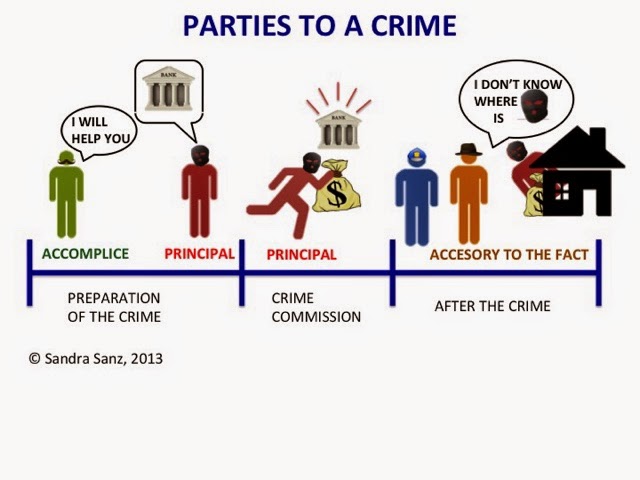Persons Exempt from Criminal Liability on Crimes Against Property
When the law provides for the exemption of filing any criminal liability to supposedly offenders, the aggrieved party cannot do otherwise. It is the law. No matter how harsh it may be, it is the law. Dura lex sed lex.
In crimes committed against property, the Revised Penal Code provides persons who are exempt from any criminal liability. However, they are not entirely without any liability because the victim may still file any civil liability to recover damages it may have from the commission of such crimes.
What are the crimes wherein some persons may be exempt from any criminal liability despite its commission?
These are:
1. THEFT
2. SWINDLING OR ESTAFA
3. MALICIOUS MISCHIEF
Who are the persons exempt from any criminal liability of the above-mentioned crimes?
1. Spouses - what is contemplated here by law is the legal spouse. The spouses must have been lawfully wed, otherwise, this exemption shall not apply. Thus, if a husband committed a crime of theft against the wife, the former is not criminally liable.
2. Ascendants and Descendants - it is the relationship of the parties from ascendants to descendants. For instance, Parents to Child, Grandparent to Grandchild, Great grandparents to Great grandchild, so on and so forth.
3. Relatives by Affinity in the Same Line - this relationship is created by fiction of law. Because of the marriage of the spouses, the relatives of one spouse may be connected to other spouse via operation of law. Thus, the relationship exists in Parents-in-Law to Child-in Law.
In crimes committed against property, the Revised Penal Code provides persons who are exempt from any criminal liability. However, they are not entirely without any liability because the victim may still file any civil liability to recover damages it may have from the commission of such crimes.
What are the crimes wherein some persons may be exempt from any criminal liability despite its commission?
These are:
1. THEFT
2. SWINDLING OR ESTAFA
3. MALICIOUS MISCHIEF
Who are the persons exempt from any criminal liability of the above-mentioned crimes?
1. Spouses - what is contemplated here by law is the legal spouse. The spouses must have been lawfully wed, otherwise, this exemption shall not apply. Thus, if a husband committed a crime of theft against the wife, the former is not criminally liable.
2. Ascendants and Descendants - it is the relationship of the parties from ascendants to descendants. For instance, Parents to Child, Grandparent to Grandchild, Great grandparents to Great grandchild, so on and so forth.
3. Relatives by Affinity in the Same Line - this relationship is created by fiction of law. Because of the marriage of the spouses, the relatives of one spouse may be connected to other spouse via operation of law. Thus, the relationship exists in Parents-in-Law to Child-in Law.
4.
Widowed Spouse - the spouse mentioned here is that one who was lawfully
married. It is only limited to those property of the deceased spouse
before the same shall have passed into the possession of another. Once
the said property shall have passed into the possession of another, this
exemption shall not apply.
5. Brothers and Sisters - the law does not define whether the relationship should be legitimate or not. What is important is they are brothers or sisters. Regardless whether or not they are living in the same roof, the exemption may still be invoked.
5. Brothers and Sisters - the law does not define whether the relationship should be legitimate or not. What is important is they are brothers or sisters. Regardless whether or not they are living in the same roof, the exemption may still be invoked.
6.
Brothers-in-law and sisters-in-law - specifically mentioned in the
provision of the law that these in-laws are only exempted from the
crimes mentioned above if they are living together with the victim.
Otherwise, this exemption shall not apply.
Please take note that the exemption are only for the three crimes mentioned. Otherwise, they are not exempted. Thus, a father may be charged of parricide if he killed his child. Despite their relationship, the exemption is not applicable.
Also, the exemption shall not apply to strangers who are in cahoots with the persons mentioned above. Thus, if the brother has a stranger, who is not related whatsoever to the victim, in committing the crime of estafa, the strangers are not exempt from the crime of estafa. Only the brother may be exempted.
Please take note that the exemption are only for the three crimes mentioned. Otherwise, they are not exempted. Thus, a father may be charged of parricide if he killed his child. Despite their relationship, the exemption is not applicable.
Also, the exemption shall not apply to strangers who are in cahoots with the persons mentioned above. Thus, if the brother has a stranger, who is not related whatsoever to the victim, in committing the crime of estafa, the strangers are not exempt from the crime of estafa. Only the brother may be exempted.


Comments
Post a Comment